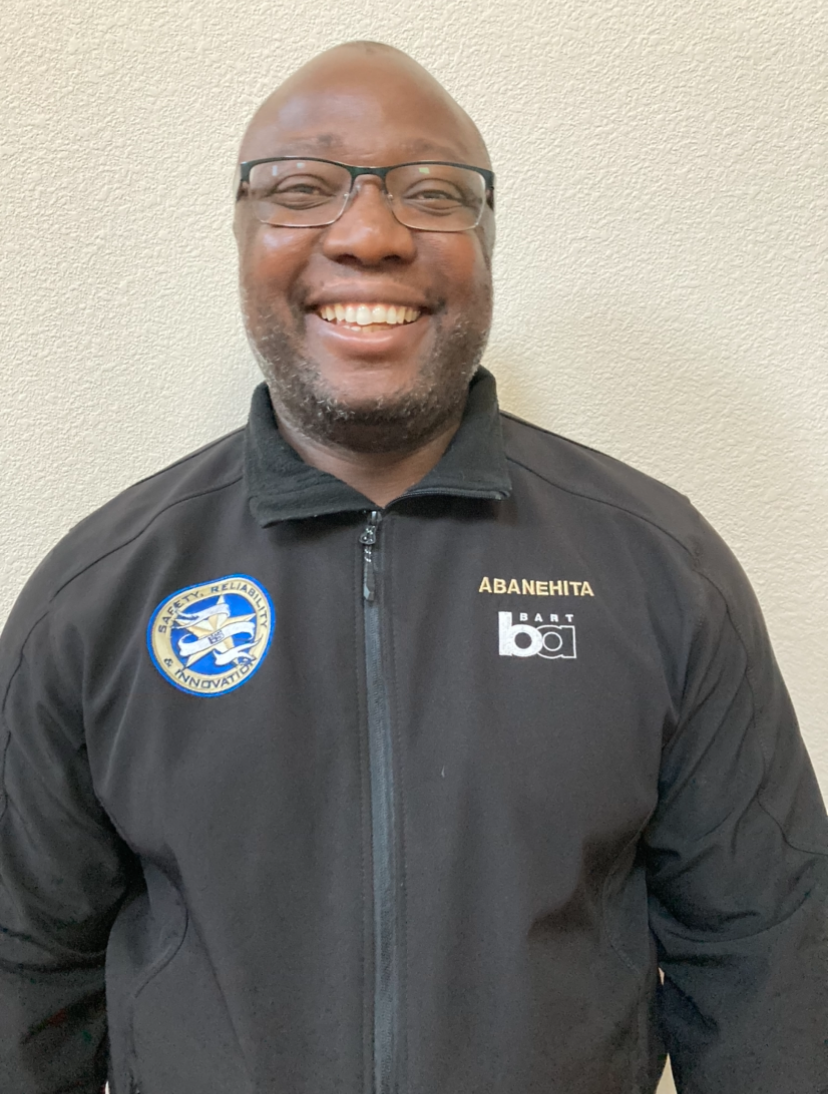The Senior Engineer whose summer interns still text him for advice and guidance

Abanehita Esoimeme knows it’s important to talk about failure.
A Senior Engineer in the Integration Engineering Department, Esoimeme joined BART three years ago. Just months after starting at the transit agency, he began serving as a mentor for BART’s robust Summer Engineering Internship Program. One of the biggest lessons he’s taught his mentees: Sometimes, we fail.
“I always tell them, every successful person has probably failed more than they’ve been successful,” Esoimeme said recently. “We all fail. You just have to learn from it.”
For Esoimeme, talking about failure is a matter of talking about humanity, and shared humanity at that. He compares his approach to failure with the root cause analysis he has performed on rectifiers in substations (Rectifiers convert the alternating current provided by the electric company to the direct current our trains use). To conduct a root cause analysis, the engineer must first determine where and why the so-called failure occurred. Then, he or she must devise countermeasures to prevent it from happening again. The same process should apply to all of our mistakes, Esoimeme said.
“You must learn from your mistakes and determine what you’re going to do differently next time,” he tells all of his mentees.
Mentorship is important to Esoimeme. As a young engineer, Esoimeme said he didn’t have a lot of guidance within the field. After graduating with a degree in chemical engineering from Cal Poly Pomona, he felt “really lost.”
“I didn’t have proper guidance. My parents were not engineers, so I had to figure out a lot on my own,” he said. “I failed a lot, but I learned from those mistakes.”
Esoimeme still keeps in touch with every single one of his mentees from the Summer Engineering Internship Program – a testament to his generosity of spirit and wisdom.
“They still text me for advice,” he said. “They really appreciate the opportunities they were given at BART.”
A native of Nigeria, Esoimeme and his family moved to the U.S. when he was fifteen. Adjusting to life in America was not easy.
“In Nigeria, we were struggling, things were really bad,” Esoimeme said. Until 1999, the country was under a military dictatorship, and “basic amenities just weren’t there.”
Things were different in America, and sometimes challenging to adjust to. Esoimeme said he experienced a massive “culture shock” when he first arrived.
“Nigerians and Africans are very forthcoming and direct,” he said. “In American culture, you have to be very empathetic to an extent when communicating with people. It was a matter of understanding the way life works here and learning how to interact with the people here.”
As he got older and entered university, Esoimeme knew he wanted to do something in STEM. Initially, he thought that thing was medicine, until he took molecular cellular biology and hated it. He realized quickly he leaned more toward math.
“That biology class was the silver bullet that said, you’re not going to be a doctor, you’re going to be an engineer,” Esoimeme said.
Before joining BART, Esoimeme worked first in manufacturing: pharmaceutical and beverage industries. He had heard a lot about BART, but only ridden it once. Then, he started doing some research.
“One of the biggest drivers for me to want to come to BART was seeing all the capital projects they were pushing forward after the passage of Measure RR,” he said. “I thought it would be great to be a part of the agency during this integral moment.”
Esoimeme submitted his resume to a pool posting and, a few months later, got the job. Since then, he’s worked on a huge variety of projects within the Integration Engineering group, ranging from upgrading and relocating an Automatic Transfer Switch to getting a series of failed Gutor UPS (Uninterrupted Power Supply) units up and running.
BART is Esoimeme’s favorite workplace so far. It’s also the most diverse, he said.
“BART is the first company I’ve worked at where I actually work with Black engineers,” he said. “When you talk about African American representation in engineering, BART has it.”
According to the Pew Research Center, just five percent of engineers in the U.S. are Black. Seventy-three percent are white.
At previous jobs, because of his race, Esoimeme sometimes felt like he wasn’t as “smart” as other people. He wasn’t sure he’d ever move up the ladder.
“At BART, where you see a diverse group of engineers across different levels, it really pushes your perspective to, hey, you could be at the top someday,” he said. “You feel included, you feel that you have a voice, and you feel like you’re a part of something.”
Part of what’s made Esoimeme’s transition to BART such a joyful experience is his team and manager.
“My boss, Ni Lee, is a great leader and a barrier remover for her team,” he said. “I love that about her, and I love that about my team.”
He suspects he will work at BART for a long time – hopefully until retirement. And who knows how high he will soar until then.
“At BART, there are always opportunities to move up the ladder,” he said. “The question is, are you willing to take on those opportunities?”
BART’s Summer Engineering Internship Program is now open for applications. Learn more and apply at bart.gov/jobs.